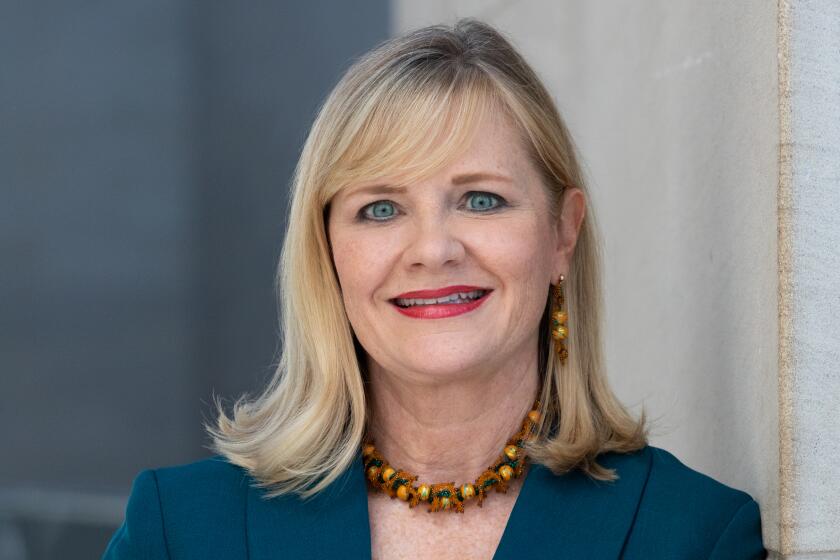MUSIC REVIEW : San Diego Opera’s Sunny Version of ‘L’Elisir d’Amore’
There are no big names on the stage or in the pit of the Civic Theater for the San Diego Opera version of Donizetti’s “L’Elisir d’Amore.”
The ensemble is dominated by bright young artists who seem equally concerned with dramatic credibility and musical virtue. Robert Darling’s naive turntable set and pleasant-peasant costumes date back to Lotfi Mansouri’s low-budget production in San Francisco some 20 years ago. Lou Galterio’s apt if not particularly imaginative staging scheme doesn’t even know what a gag or a gimmick is.
This “Elisir” may not look dewy fresh. It certainly does not strain to discover new facets in the music or libretto. Nevertheless, it remains reasonably pretty, moves forward with speed and purpose, exudes gentle charm and, probably most crucial, sounds lovely.
The San Diego forces manage to project the inherent sentiment and humor without resorting to the usual bathos at one extreme or the usual buffoonery at the other. They treat Donizetti and his clever librettist, Felice Romani, with abiding elegance and respect. That isn’t always the case with the more expensive spreads in New York, San Francisco or Milan.
Saturday night, Willie Anthony Waters, the debutant conductor from Miami, kept the patter invariably brisk and light, the dramatic accents pointed, the lyrical flights graceful. This man understands the intimate implications of bel canto.
The same can be said of Galterio. Savoring the impact of restraint, he made sympathetic figures of the potential stock types, set their amusing dilemmas in motion, then sat back, relaxed and enjoyed the operatic ride.
Glenys Fowles, the Australian soprano familiar from appearances with the New York City Opera, returned as Adina after a 10-year absence. Her soprano has gained a bit in richness and size, but she has lost none of her coloratura facility, little of her vocal sweetness and purity, none of her temperamental acumen.
Although her tone may tend to harden a bit at the top these days, one finds ample compensation in her pert, unforced charm and in her thoughtful illumination of the text.
Denes Gulyas may not resemble the most endearingly pathetic of Nemorinos, but he is always attentive, always straightforward, always conscientious as an actor.
As a singer, he may not be able to offer the biggest or most colorful sounds in the world. Nevertheless, he is a pianissimo paragon who caresses the long, slender lines in a manner sensitive enough to justify comparisons with Tagliavini and the young Di Stefano.
His exquisite performance of “Una furtiva lagrima” was all but ruined, unfortunately, by the boorish intrusion of premature applause.
David Malis, a rather colorless Papageno this season in San Francisco, emerged here as a marvelously blustery, mock- macho Sergeant Belcore blessed with a poised and flexible Dieskau-esque baritone.
John del Carlo completed the central quartet as a towering, wily yet hearty Dr. Dulcamara. He made the not-so-old quack especially authoritative by actually singing the music with a dark, healthy, expressive baritone. No hoots, no wheezes, no gulps or parlando evasions for him.
Deborah Clague as Gianetta led the chorus of potentially lovesick maidens deftly. Their manly counterparts went about their bucolic duties with casual verve and swaggered in seedy splendor when called to military duty.
It was, in all, a nice night at the opera.
More to Read
The biggest entertainment stories
Get our big stories about Hollywood, film, television, music, arts, culture and more right in your inbox as soon as they publish.
You may occasionally receive promotional content from the Los Angeles Times.






